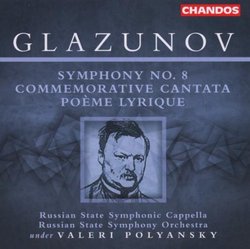| All Artists: Alexander Glazunov, Valery Polyansky, Ludmila Kuznetsova, Russian State Symphony Orchestra, Vsevolod Grivnov Title: Glazunov: Symphony No. 8; Commemorative Cantata; Poème Lyrique Members Wishing: 0 Total Copies: 0 Label: Chandos Original Release Date: 1/1/2002 Re-Release Date: 6/24/2003 Genre: Classical Styles: Opera & Classical Vocal, Symphonies Number of Discs: 1 SwapaCD Credits: 1 UPC: 095115996126 |
Search - Alexander Glazunov, Valery Polyansky, Ludmila Kuznetsova :: Glazunov: Symphony No. 8; Commemorative Cantata; Poème Lyrique
 | Alexander Glazunov, Valery Polyansky, Ludmila Kuznetsova Glazunov: Symphony No. 8; Commemorative Cantata; Poème Lyrique Genre: Classical
|
Larger Image |
CD DetailsSimilar CDs
|
CD ReviewsA very persuasive account of Glazunov's Masterpiece. David A. Hollingsworth | Washington, DC USA | 12/13/2003 (5 out of 5 stars) "Glazunov's Eighth Symphony, written in 1906 during Russia's tumultuous period, demonstrates the composer's maturity as an instinctive yet a very good symphonist. The first movement is quite contrasted between the optimism and some of the disturbance and it is not quite easy to come off. Its confident, somewhat assertive opening played by the strings and brass, gives way to the lyrical warmth at 2'06" that have a sense of poignancy about it, even more so at 5'53" when the articulation becomes more disturbed and wanting of inner tranquility. The lyrical warmth remains, however, and serves as a reminder of the Russian past not quite as tumultuous as it was by the turn of the Twentieth Century.
But turn to the middle movements and witness Glazunov's well known emotional equilibrium thrown out the window. In terms of emotional depth and the somewhat earth-shattering intensity, this very fine Mesto movement clearly out-rivaled the previous slow movements of his symphonies. The beginning bars of the movement is rather outside of Glazunov's usual style, with a forceful, volcanic tutti rather Tchaikovskian in vein (by the strings, then brass with timpani). The melancholy is at all present here and I find captivating how the climax, a reprise of the forceful tutti of the beginning, manages to be menacing yet so advanced in it melodic language (Scriabin comes to mind here in particular). But the Scherzo (more of a Rondo) is rather menacing also. Elena Glazunov-Gunther, the composer's adopted daughter, called the movement "diabolical." It's swirling passages of the strings especially towards the end is fierce in temperament. There's hardly anything gaiety about it. But the finale is quite an exception to that, even though it starts off reflectively as though the composer was stepping back for a moment and catching his breadth. Did this sense of struggle turned hopefulness (real or imagined) of this movement, and of this Symphony for that matter, have any anticipation or influence on the later generations of composers during the era of Stalinism and the Great Patriotic War? The other works on this disc are likewise very attractive. The Commemorative Cantata (to celebrate the one-hundredth birthday anniversary of Alexander Pushkin) was written in 1899 during the heights of Glazunov's career and fame. The text, provided by Grand Duke Constantine Romanov, is, at least for the most part, genuine though lacking in ingenuity (sentimental doggerel are David Nice's good choices of words here, for the text runs a risk of robbing the full meaningfulness of the occasion). But the music is quite witty and flawless, with Glazunov thematic invention and craftsmanship on their usual high plane. The moderato is particularly an enchantment and a foretaste to Rimsky-Korsakov's later operas. Glazunov's earlier work, Poeme Lyrique (1884-1887), shows us why Tchaikovsky warmed to this work. It's sentimentality is not in question here. But the underlying beauty and passion in this score set the stage for the later Glazunov we grew to admire and even adore. The performances here are exceptionally fine from this team. Like Gennady Rozhdestvensky, Valeri Polyansky is very visionary in the Symphony while never too impulsive (I like the reflective qualities he brings forth in the first movement). The Mesto movement is particularly well played, with the climax that comes off with powerful menace, yet with no mania, appropriately so. And while Anissinov's treatment of the Scherzo movement brings out the devilish qualities of it most successfully, Polyansky is never less than being convincing. Polyansky's ways with the finale have its virtues too, with the beginning that's again reflective. As with the Poeme Lyrique, the Commemorative Cantata is likewise a pleasure of hearing under his hands (and the singing of Ludmilla Kuznetsova and Vsevolod Grivnov are excellent). The approach to the Cantata is stylish, though not too adorned of the reading, and while the Russian State Symphonic Cappella remains first class, the Russian State Symphony Orchestra is becoming more of a well-tuned ensemble. The strings are attractively well-bloomed and full bodied while the brass have a wonderful presence about it (it's well blended and polished). The recordings are clear, warm, and lucid. Moreover, David Nice's booklet essay is of a demonstration class, though he perhaps could've mention a possible Sibelian influence upon this momumental work (or conversely). It's rather striking how Mr. Nice raises the question of whether Elgar studied Glazunov's music before embarking on his Second Symphony, not just because he raises the question per se, but also because he was not the first person to do so, given that Glazunov's music was well played in Russia and the West during Elgar's time (with Bax being among his more ardent of admirers). It goes without much saying that the recorgnition of Glazunov's musical art and influence have yet to achieve a more fuller bloom outside Russia. So, with that said, this album is warmly recommended." |

 Track Listings (10) - Disc #1
Track Listings (10) - Disc #1